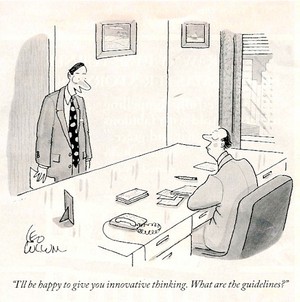28 March 02008
Against Method in Innovation
 I've signed up for NESTA's Innovation Edge conference in a few weeks. Though I'm looking forward to what promises to be a stimulating day, I'm kind of surprised that the abstract concept of innovation remains so popular with policy makers and agencies.
I've signed up for NESTA's Innovation Edge conference in a few weeks. Though I'm looking forward to what promises to be a stimulating day, I'm kind of surprised that the abstract concept of innovation remains so popular with policy makers and agencies.
Using innovation as a catch-all term to cover a wide range of changes in products, services and organising creates the expectation that these changes share important characteristics and, critically, may share similar solutions. But do they, should they, or could they? To take the relatively narrow domain of integrated IT, on the one hand you have the Apple approach; on the other open source. How much do they have in common? Not an awful lot.
Perhaps my wariness and scepticism comes from being exposed, at an impressionable age, to Paul Feyerabend's "anything goes" approach to scientific method. Feyerabend didn't deny the value of method; he was arguing against hidebound adherence to any particular set of rules and methods. He argued for a more laissez-faire approach to combining multiple approaches, and being prepared to bend the rules when circumstances encouraged it.
If you want to wind people up, you refer to this way of thinking as epistemological anarchism. If you want to calm and reassure, you're better off talking of methodological pluralism. I'm hoping to hear both at Innovation Edge, which takes place in London on 20 May this year, and is free to attend (but places are limited and require registration).
Posted by David Jennings in section(s) Events on 28 March 02008 | TrackBack
Subscribe to my RSS feed, which covers this blog, my book blog, and further commentary on other web resources (more feeds below)
Fred Garnett on how to create new contexts for your own learning
Elaborating on Agile Learning
David Gauntlett on "making is connecting" and the end of factory learning
Dick Moore on Agile Learning, Agile Software Development and the Mobile Internet
Agile Learning: better results for less money
University of Death by Sean McManus: A Review
Counterculture, Cyberculture and Innovation: the strange case of Stewart Brand
More on self-organised learning
Reflections on Longplayer Live
Progressive austerity and self-organised learning
Round-up of talk and interviews
Applying the lessons of Last.fm to libraries and learning
Support Longplayer Live
Social media old and new: two contrasting networks
Cinema (24)
Cultural Calendar (86)
Curatorial (66)
E-learning (89)
Events (34)
Future of Music (95)
Human-Computer Interaction (62)
Ideas and Essays (36)
Long Now (17)
Miscellany (41)
Music and Multimedia (156)
Playlists (27)
Podcasting (12)
Politics (12)
Radio (48)
Reviews (54)
Social Software (59)
Teaching (20)
Alternatively, see the Date-based Archives
Recommended: RSS feed that combines items on this site, my book blog, and commentary on other web resources
RSS feed for this site only
RSS feed for my book, Net, Blogs and Rock'n'Roll
RSS feed for shared bookmarks
My latest bookmarks (click 'read more' for commentary):
My archived bookmarks (02004-02008)
On most social sites I am either 'davidjennings' or 'djalchemi', for example: Flickr, Last.fm, Ma.gnolia and so on…
Lateral Action — managing creativity
Herd — social cognition
Seb Schmoller's e-learning mailings
Viridian Design Movement
Tom Phillips — artist
Long Now blog — resources for long-term thinking
Longplayer live stream — 1,000-year composition

The contents of this site are licensed under a Creative Commons Licence except where otherwise notified.
Hosted by Paul Makepeace
W3C Standards
Check whether this page is valid XHTML 1.0
Check whether the CSS (style sheet) is valid

